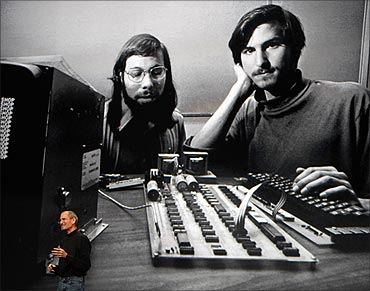 | « Back to article | Print this article |
Steve Jobs learnt intuition in India!
The seven months that Steve Jobs spent wandering in India in search of spiritual enlightenment were "not a waste of time", his biographer has said, with the late Apple co-founder telling him his time in India taught him "intuition".
In an interview with the CBS, biographer Walter Isaacson says Jobs' design sense was greatly influenced by the "simplicities of Zen Buddhism."
Click NEXT to read more...
Steve Jobs learnt intuition in India!
Isaacson's book 'Steve Jobs' will hit bookstores today. In the 1970s, Jobs took a leave from working as a technician at video games manufacturer Atari and spent seven months wandering across India looking for spiritual enlightenment.
"And it turned out not to be a waste of time," he says. According to Isaacson, when Jobs returned from India he said, "The main thing I've learned is intuition, that the people in India are not just pure rational thinkers, that the great spiritual ones also have an intuition."
Click NEXT to read more...
Steve Jobs learnt intuition in India!
Isaacson says that "the simplicities of Zen Buddhism, really informed his (Jobs') design sense.
"That notion that simplicity is the ultimate sophistication," the biographer says in the interview.
After returning from India, Jobs and his friend Steve Wozniak founded Apple computer in his parents' garage with an initial $1,300 investment.
Click NEXT to read more...
Steve Jobs learnt intuition in India!
When asked how Jobs, a hippie college dropout goes to India and comes back deciding he wants to be a businessman, Isaacson says, "Jobs has within him sort of this conflict, but he doesn't quite see it as a conflict between being hippie-ish and anti-materialistic but wanting to sell things like Wozniak's board...wanting to create a business."
"And I think that's exactly what Silicon Valley was all about in those days. Let's do a startup in our parents' garage and try to create a business."


